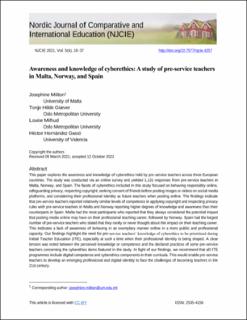Awareness and knowledge of cyberethics: A comparative study of preservice teachers in Malta, Norway, and Spain
Peer reviewed, Journal article
Published version
Permanent lenke
https://hdl.handle.net/11250/2996763Utgivelsesdato
2021-11-30Metadata
Vis full innførselSamlinger
Originalversjon
https://doi.org/10.7577/njcie.4257Sammendrag
This paper explores the awareness and knowledge of cyberethics held by pre-service teachers across three European countries. The study was conducted via an online survey and yielded 1,131 responses from pre-service teachers in Malta, Norway, and Spain. The facets of cyberethics included in this study focused on behaving responsibly online, safeguarding privacy, respecting copyright, seeking consent of friends before posting images or videos on social media platforms, and considering their professional identity as future teachers when posting online. The findings indicate that pre-service teachers reported relatively similar levels of competence in applying copyright and respecting privacy rules with pre-service teachers in Malta and Norway reporting higher degrees of knowledge and awareness than their counterparts in Spain. Malta had the most participants who reported that they always considered the potential impact that posting media online may have on their professional teaching career, followed by Norway. Spain had the largest number of pre-service teachers who stated that they rarely or never thought about this impact on their teaching career. This indicates a lack of awareness of behaving in an exemplary manner online in a more public and professional capacity. Our findings highlight the need for pre-service teachers’ knowledge of cyberethics to be prioritised during Initial Teacher Education (ITE), especially at such a time when their professional identity is being shaped. A clear tension was noted between the perceived knowledge or competence and the declared practices of some pre-service teachers concerning the cyberethics items featured in the study. In light of our findings, we recommend that all ITE programmes include digital competence and cyberethics components in their curricula. This would enable pre-service teachers to develop an emerging professional and digital identity to face the challenges of becoming teachers in the 21st century.

